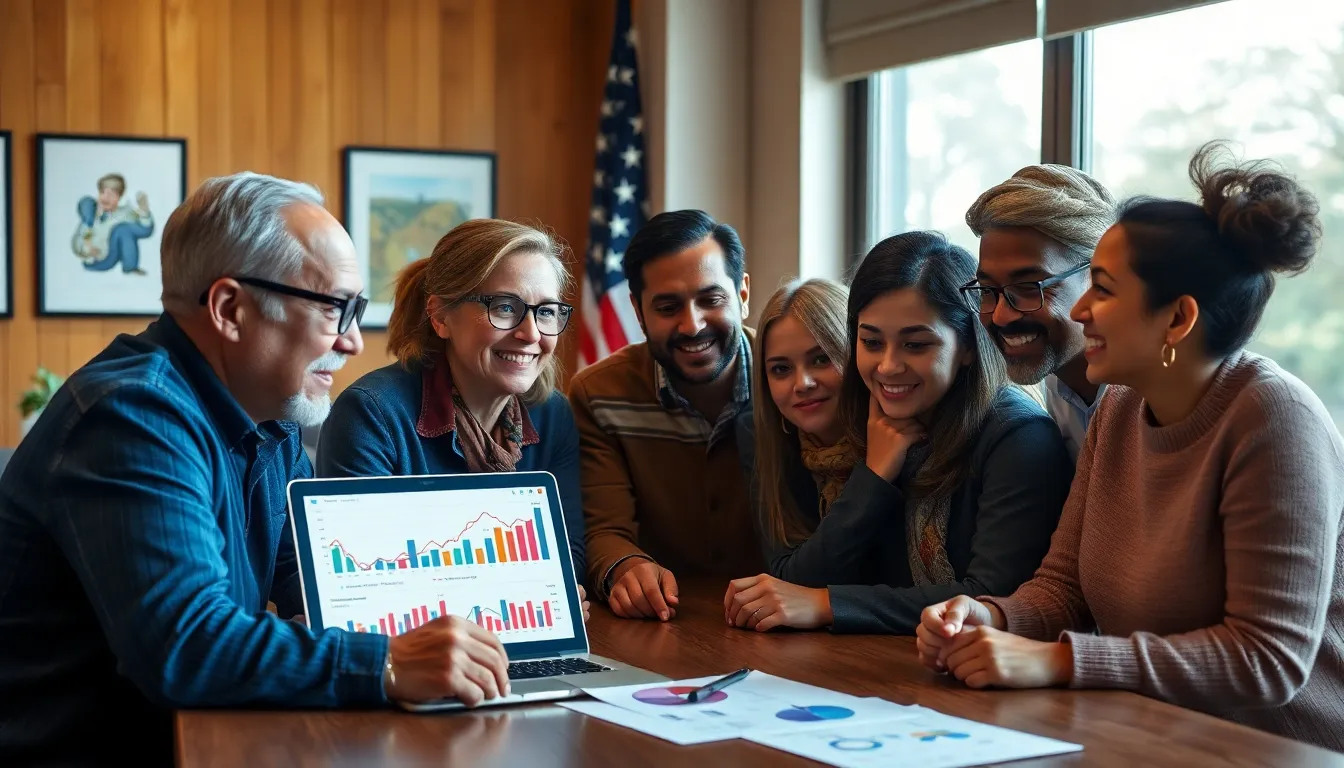In today’s rapidly changing political landscape, understanding the nuances of political dynamics is more crucial than ever. Political insights provide a lens through which individuals can navigate the complexities of governance, policy-making, and public opinion. With issues ranging from climate change to economic inequality dominating headlines, staying informed is vital for active citizenship.
By delving into the intricacies of political behavior, trends, and ideologies, one can gain a deeper appreciation for how decisions are made and their impact on everyday life. Whether it’s analyzing election outcomes or exploring the influence of social movements, these insights empower individuals to engage meaningfully in conversations that shape their communities and the world.
Table of Contents
ToggleOverview of Political Insights
Political insights encompass the analysis of governance, policy formulation, and public perceptions that shape societal behaviors. Understanding these dynamics offers individuals a clearer perspective on decision-making processes impacting their lives.
Political insights provide valuable tools for navigating complex issues. They encompass critical trends such as:
- Political Behavior: Examining how individuals and groups engage with political systems influences overall governance.
- Policy Trends: Identifying emerging patterns in legislation and regulation aids in anticipating governmental actions.
- Ideological Shifts: Recognizing changes in public ideology helps interpret evolving views on pressing matters.
Political insights inform discussions on significant topics like climate change and economic inequality. They enable individuals to understand various stakeholders’ roles, facilitating more effective engagement in civic matters. By staying informed, individuals can contribute meaningfully to both local and international dialogues.
Continuous analysis of political landscapes ensures awareness of how policies evolve and affect communities. Awareness fosters informed citizenry capable of advocating for changes that reflect collective needs and aspirations.
Importance of Political Insights


Political insights play a crucial role in grasping the intricacies of governance and societal dynamics. These insights enable individuals to engage meaningfully in civic life and influence policy discussions.
Understanding Political Trends
Understanding political trends involves analyzing shifts in public opinion, voter behavior, and emerging ideologies. Political trends reveal how citizens respond to domestic and global issues, shaping policy and governance. For example, rising concern for climate change is driving a shift towards greener policies among lawmakers. By identifying these trends, individuals gain clarity on which actions resonate with their beliefs, helping them align their civic engagement strategies.
Impact on Decision Making
Political insights significantly impact decision-making processes at various levels. In local, state, and national governance, insights inform policymakers about the needs and preferences of constituents. For instance, data showing increased support for healthcare reform prompts lawmakers to prioritize health initiatives. Moreover, individuals equipped with political insights can advocate effectively for issues that matter to them, fostering a collaborative environment for change. Understanding the motivations behind governmental actions enhances the ability to anticipate future decisions, enabling citizens to participate proactively in democratic processes.
Sources of Political Insights
Political insights derive from various sources that provide valuable information about governance, policy-making, and public opinion. Recognizing these sources helps individuals analyze and navigate political landscapes more effectively.
Traditional Media Outlets
Traditional media outlets, including newspapers, television, and radio, play a critical role in shaping political insights. They offer in-depth analysis of political events, interviews with experts, and coverage of government actions. These platforms often provide data-driven reports and investigative journalism that reveal underlying issues within politics. Surveys and polls conducted by reputable media organizations give valuable insights into public opinion, enabling individuals to gauge voter sentiment and anticipate political outcomes.
Social Media Influence
Social media has transformed political engagement and information dissemination. Platforms like Twitter, Facebook, and Instagram provide real-time updates on political events and facilitate discussions among users. Political leaders and organizations leverage these channels to communicate directly with constituents, shaping narratives and mobilizing support. Hashtags and viral campaigns often highlight key issues, allowing individuals to participate in wider conversations. However, the prevalence of misinformation on these platforms necessitates critical evaluation of sources to ensure accurate understanding of political dynamics.
Analyzing Political Insights
Analyzing political insights involves examining governance, policy-making, and public perceptions that influence societal behaviors. Key trends include shifts in public opinion, voter behavior, and emerging ideologies, which are vital for anticipating government actions and interpreting evolving societal views. For example, growing concern over climate change prompts legislators to adopt greener policies. Individuals informed about these trends can engage more effectively in community discussions and advocate for changes that align with collective needs.
Insights into decision-making processes at local, state, and national levels prove significant. Political insights equip policymakers with knowledge about constituents’ needs, influencing their prioritization of issues such as healthcare reform when public interest rises. Individuals equipped with such insights advocate more effectively for critical issues, fostering collaborative efforts for change. Understanding governmental motivations enhances citizens’ abilities to anticipate decisions, facilitating proactive participation in democratic processes. Continuous analysis of political landscapes cultivates an informed citizenry capable of meaningful contributions to local and international dialogues.
Various sources provide essential political insights for analyzing political landscapes. Traditional media, including newspapers, television, and radio, deliver in-depth analyses, expert interviews, and data-driven reports that uncover fundamental political issues. Surveys and polls from reputable organizations also offer valuable public opinion insights, enabling individuals to gauge voter sentiment and predict electoral outcomes. Social media platforms transform political engagement by facilitating real-time updates and direct interactions between political figures and constituents. However, misinformation on these platforms requires rigorous source evaluation to achieve a comprehensive understanding of political dynamics.
Case Studies of Political Insights
Case Study 1: Climate Change Policy Formulation
Analyzing recent political insights reveals how climate change has influenced policymaking. In 2021, the U.S. federal government introduced significant climate legislation spurred by public concern over extreme weather events. This legislation includes investments in renewable energy and emission reduction targets, significantly shaped by public opinion data collected through surveys by organizations like Pew Research Center.
Case Study 2: Voter Behavior Trends
Investigating voter behavior trends during the 2020 U.S. presidential election offers critical insights. Reports from the U.S. Census Bureau indicated that 159 million Americans voted, reflecting a voter turnout of approximately 66.7%. Demographic analyses identified shifts in younger voter engagement and increased participation among minority groups, which prompted both parties to adjust their campaign strategies to address these evolving voter preferences.
Case Study 3: Healthcare Reform Advocacy
Exploring advocates’ efforts in healthcare reform demonstrates the power of political insights. In 2019, over 80% of Americans expressed support for universal healthcare in polling data sourced from Gallup. This public sentiment directly influenced legislative priorities, leading lawmakers to propose comprehensive healthcare bills aimed at expanding access and reducing costs.
Case Study 4: Social Media’s Role in Political Discourse
Examining social media’s impact on political discourse highlights a significant case from the 2016 election. Analysis from the Knight Foundation indicated that 62% of Americans utilized social media for political information. The real-time nature of these platforms allowed candidates to react swiftly to voter concerns, shaping campaign narratives and strategies based on immediate public feedback.
Case Study 5: International Relations Shifts
Understanding political insights in international relations can be illustrated through the response to the COVID-19 pandemic. Studies from the World Economic Forum revealed that nations prioritizing transparency and collaboration experienced greater success in vaccine distribution and public compliance with health guidelines. This insight informs future diplomatic strategies, emphasizing the importance of cooperation in global crises.
These case studies underscore the practical applications of political insights in addressing contemporary issues, illustrating how they shape policy outcomes and civic engagement.
Political insights are crucial for fostering an informed citizenry capable of engaging with pressing issues. By understanding the dynamics of governance and public opinion individuals can better navigate the complexities of policy-making. This knowledge empowers them to advocate for change and participate actively in democratic processes.
The ongoing evolution of political landscapes highlights the importance of staying updated on trends and shifts in public sentiment. As citizens become more engaged they contribute to meaningful discussions that shape their communities and the world. Embracing political insights ultimately leads to a more responsive and responsible governance that reflects collective aspirations.



